Is Rice Good For Bulking?
Author:
Unlock your full potential by engaging with our experts and community! Have questions about your fitness journey or looking for expert advice on weightlifting techniques? Don’t hesitate — leave a comment below and David Sasha Schulz will provide a personalized answer and insights to help you reach your goals.
Torokhtiy is reader-supported. Some links are affiliate links, and we may earn a commission at no extra cost to you. See our disclosure page for details.
If you want to gain some extra muscle but are unsure if rice suits your new meal plan, you’ve come to the right place. Rice is one of the most popular staple foods in many pantries, and often, bodybuilders include it in their diets.
But, is rice good for bulking? Or, is it better to have it in another phase?
In this article, we’ll review why rice is good for bulking. We will also give you tips on determining how much rice you need for bulking, the best rice for bulking (white vs. brown rice), and how to eat rice safely.
When choosing the best foods for bulking, is rice good for bulking? — Yes, rice can be a healthy carb to help you reach your calorie and carb needs. Since it’s easily digestible, it won’t make you feel too stuffed and can help replenish glycogen stores, and promote muscle growth.
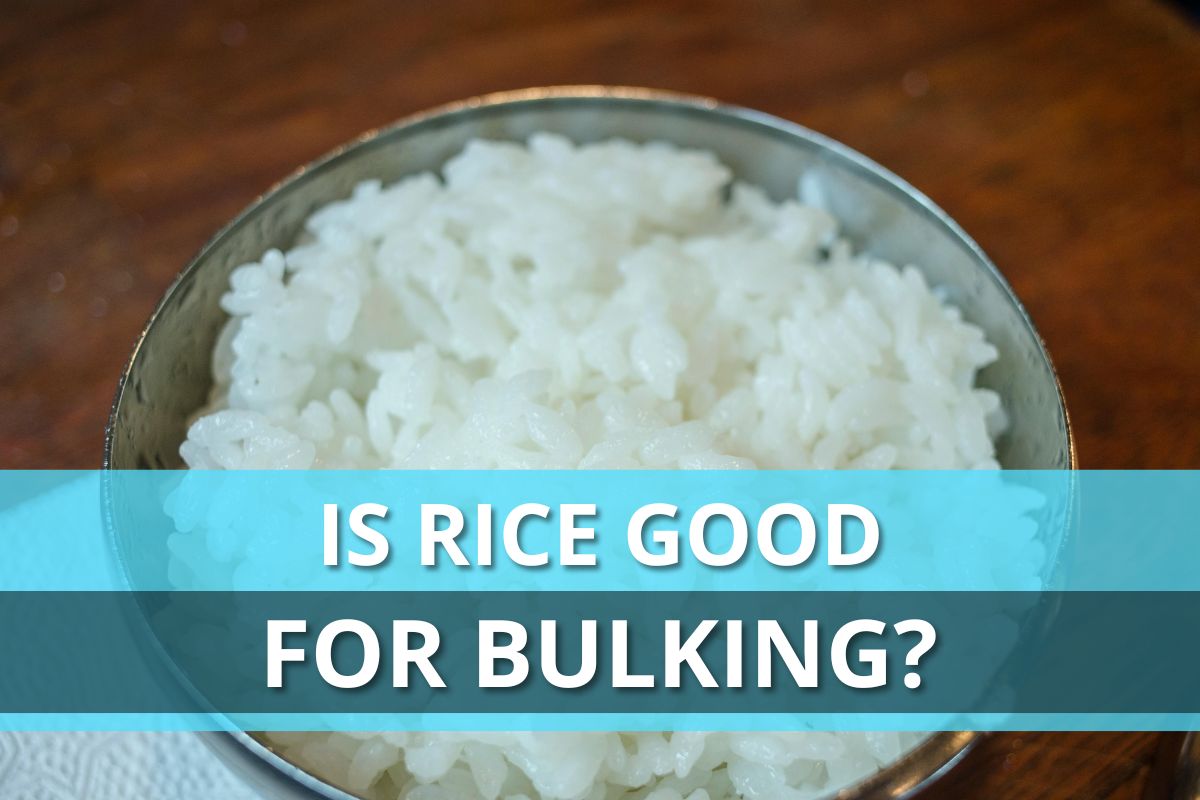
Is Rice Good for Bulking?
Bulking requires you to reach a caloric surplus (eat more calories than the body needs) to support muscle growth. While most bodybuilders focus on reaching their protein requirements (which is important), carbs are often demonized or forgotten.
However, carbs are nearly as important as proteins. Carbs help replenish glycogen stores, which can help improve recovery and get you ready for the next workout.
The carb intake might vary widely among bodybuilders, but start in a range between 4 to 7 grams of carbs per kilogram of body weight. Adding high-carb foods, such as rice to your meal, can be a good way to help you reach your caloric and carb needs.
1. How Much Rice Should I Eat for Bulking?
Before we talk about how much rice you should have, it’s important to understand the nutritional properties of rice.
One cup of cooked white rice (174 grams) provides the following nutrition:
- Calories: 169
- Carbs: 36.7 grams
- Fiber: 1.7 grams
- Proteins: 3.5 grams
- Fats: 0.3 grams
Once we know the nutritional information of rice, we can determine how much rice you eat for bulking based on your needs.
As mentioned, the average recommendation for bulking is 4 to 7 grams of carbs per kilogram of body weight. This means that if a bodybuilder weighs 200 lbs, they should consume 364 to 636 grams of carbs daily.
Now, keep in mind that this doesn’t mean that all of your carbs need to come from rice. While rice is a good carb source, you still need variety to ensure you get different nutrients and promote the best conditions for muscle growth.
If you understand your needs, you can determine how many cups of rice you eat per meal. But, if you don’t know how many carbs you need per day and per meal, it’s a good idea to determine this first. So, ask a health professional for some guidance.
Based on the previous information, those who know how many carbs you need per meal can determine how many cups you need. If you need to eat 100 grams of carbs in a meal, this means that you can eat 2¾ cups of rice in a meal. Now, keep in mind that this might be less if you are adding other sources of carbs.
If you are still struggling to determine how much you need, there are great calorie and macro trackers that can help you create a more detailed meal plan.
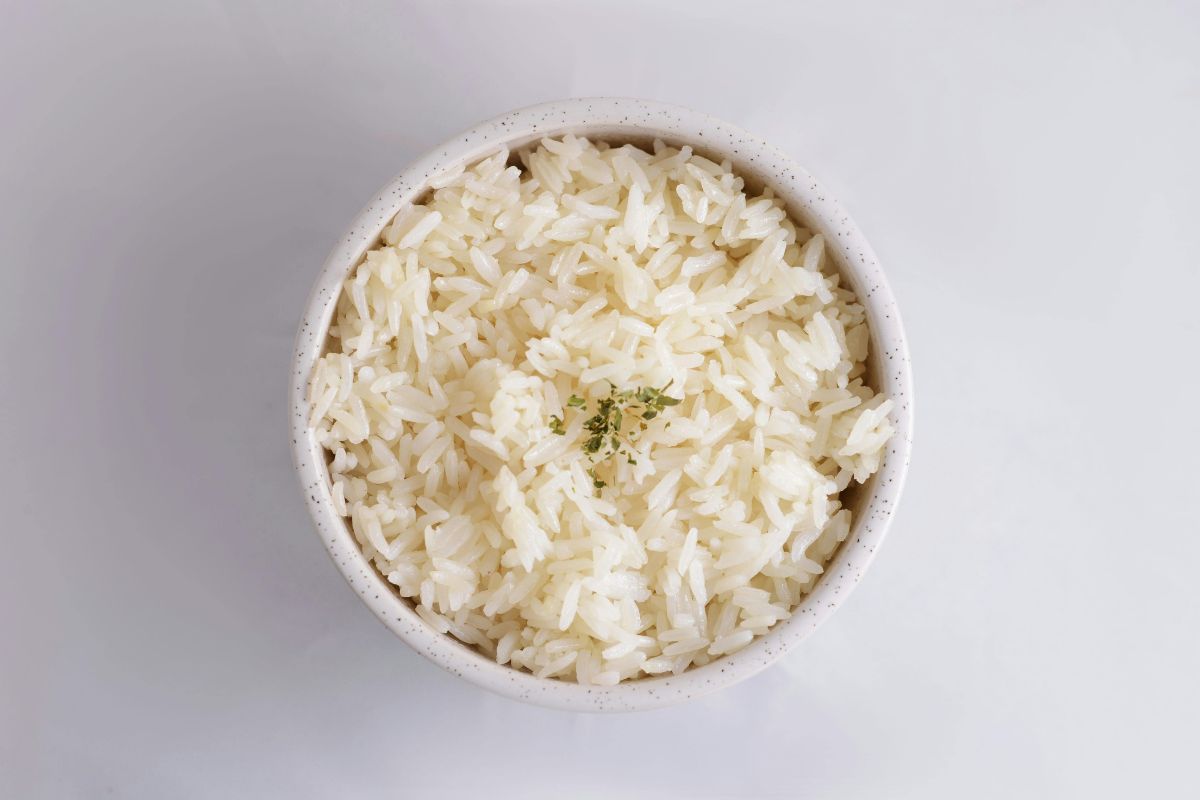
2. Can I Eat Rice Every Day?
Yes, you can eat rice every day. While we understand that rice can be a quick and easy carb that is good for meal prepping, we recommend you add other sources. Adding other sources of carbs guarantees different essential nutrients, which can help improve overall health and recovery.
Also, keep in mind that white rice is low in fiber. To promote good digestion and bowel movement, the recommended fiber intake for men is 30 to 34 grams, and for women, 25 to 28 grams.
So, is white rice good for bulking? Relying on white rice as your main carb source might not provide the necessary fiber intake to help promote good gut health. That is why you still need other sources of carbs.
3. Brown Rice vs. White Rice: Which Is Better?
The difference between brown rice and white rice is that one undergoes more processing (white rice) than the other. Brown rice contains all the parts of the grain (germ, bran, and endosperm). That is why brown rice tends to be higher in fiber than white rice.
But, is it really that different, and should you choose white or brown rice for bulking? Let’s take a closer look at the nutritional information of both. The following table compares the nutritional information for white rice vs. brown rice for bodybuilding.
| Nutrition Information | 100 grams white rice cooked | 100 grams brown rice cooked |
|---|---|---|
| Calories | 97 | 123 |
| Carbs (grams) | 21.1 | 25.6 |
| Fiber (grams) | 1.0 | 1.6 |
| Proteins (grams) | 2.0 | 2.7 |
| Fats (grams) | 0.2 | 1.0 |
Generally speaking, brown rice can be a better option since it’s higher in fiber and nutrients. Research also shows that it can provide more stable energy levels.
However, while brown rice has more fiber, the difference is not very large (only 0.6 grams), and keep in mind that more fiber is not always better. Eating too much fiber (for those not used to it) can increase digestive issues, such as gas, bloating, and stomach cramps.
In the end, choose the one you like and feel more comfortable adding to your meals to help you reach your calories and macros.
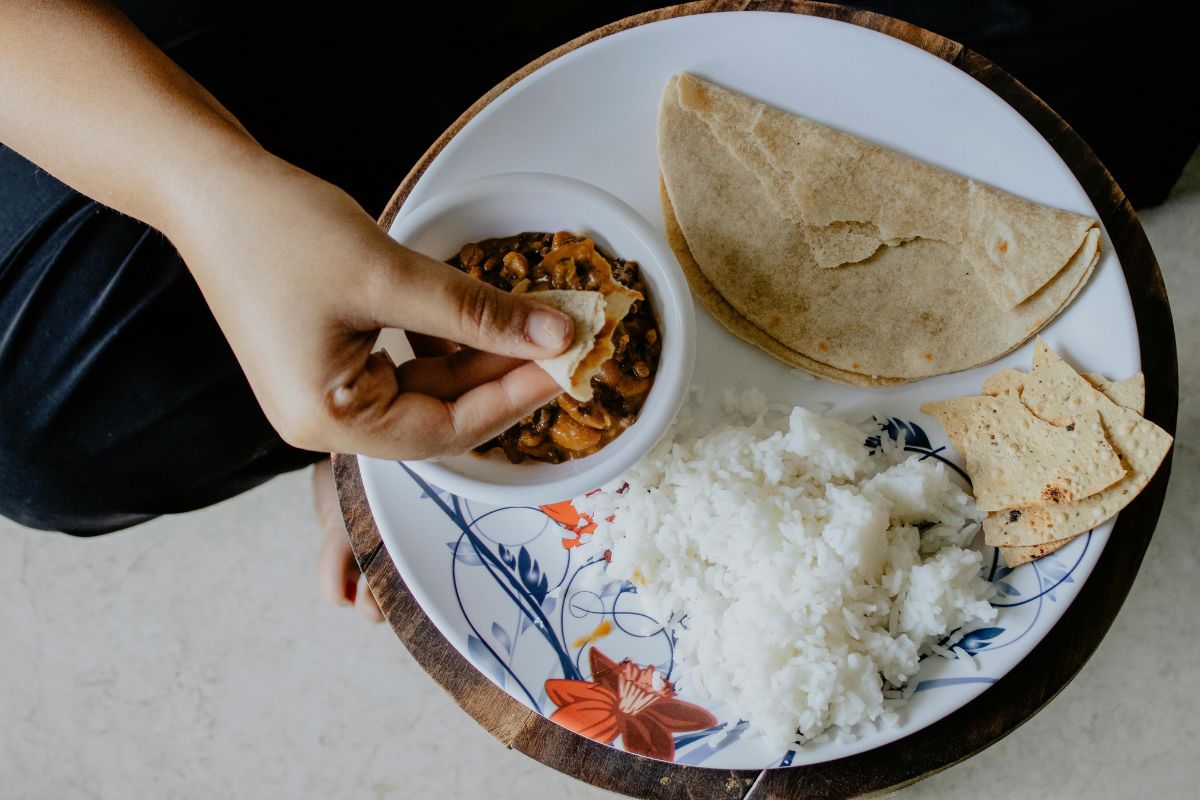
4. Eat Rice Safely
Finally, be careful how you store rice and how often you reheat it. Uncooked rice might contain bacteria spores (Bacillus cereus) that can cause food poisoning. One of the issues is that these spores might withstand cooking.
That is why you should never leave cooked rice at room temperature since it can increase its growth, causing possible diarrhea and vomiting.
So, after cooking it, cool it down as quickly as possible , and only make sure to reheat it once since constantly reheating it can increase the risk of spore growth.
If you batch-cook rice, you can set the portions in individual containers and place them in the freezer. When in need, simply grab and reheat each serving.
What’s the Optimal Energy Surplus for Bulking?
How many calories you need to gain muscle mass is rather a complex answer. There are a lot of factors that need to be considered, such as age, weight, height, and activity levels.
Research shows that to gain 1 kg of muscle, you may need to eat between 357 (1,500 kJ) to 955 (4,000 kJ) additional calories per day. However, this might vary for each individual as genetics play an important role in muscle growth.
The best way to determine how many calories you need is to seek professional help to guide you on the best approach for your goals and needs. Also, a higher caloric surplus means you are more at risk of increasing fat gain. So, if you want a cleaner bulk (more muscle and less fat increase), have a more moderate caloric surplus.
The Mass Gainer We Recommend: Transparent Labs Mass Gainer
Transparent Labs Protein Series Mass Gainer
- Diet Type (Best For): Build muscle, Mass gainer
- Suitable For Vegans: No
- Protein Source: Grass-Fed Whey Protein Concentrate
- Serving Size: 194 grams (2 scoops)
- Price Per Serving: ~$5.33
- Proteins: 53 grams
- Carbohydrates: 110 grams (depends on flavor)
- Fat: 14 grams (depends on flavor)
- Calories Per Serving: 750 (depends on flavor)
- Company Founded: 2015
- Recommended By Athletes: Hafþór Júlíus Björnsson, Terron Beckham, Paul Sklar
If you are still finding it challenging to reach your calorie and macro needs, a mass gainer might be the right supplement. The mass gainer we recommend is Transparent Labs Mass Gainer.
What makes this a great option is that it doesn’t have any artificial ingredients, it has an Informed Choice certification, and it has a fully transparent label.
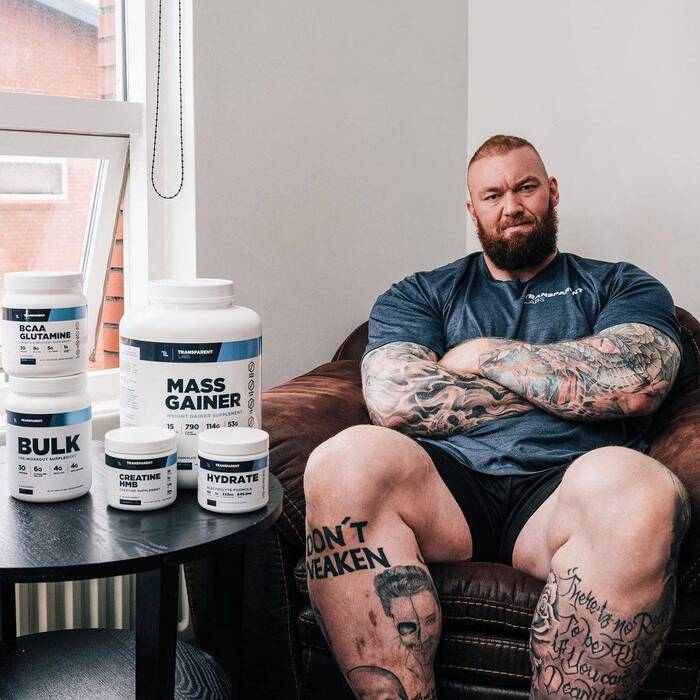
Each serving (2 scoops) offers 750 calories, 110 grams of carbs, 53 grams of proteins, and 14 grams of fats. Its carb-to-protein ratio (2:1) makes it an excellent choice if you need to add more calories but still need to have a good balance between carbs and proteins.
It also offers 3 grams of creatine, which evidence suggests can help increase performance and muscle growth.
And, the best part is that it covers the recommended intake of 3 to 5 grams of creatine (although some bodybuilders might need a higher dose).
FAQ
Is Rice a Clean Bulk?
Yes, rice can be suitable for clean bulking as long as it fits your macros and calories. Remember that clean bulking relies on these two factors. So, as long as you have these things covered, you can gain muscle with as little fat as possible.
How Much Rice Should I Eat for Bulking?
How much rice you should eat depends on your current goals and needs. A health professional can guide you on how many carbs you need based on age, height, weight, and activity goals.
How Can I Bulk Without Rice?
You can bulk without rice by adding other sources of carbs, such as potatoes, sweet potatoes, corn, quinoa, legumes, lentils, chickpeas, and pasta.
Make sure you understand your calorie and macro needs based on age, weight, height, and activity levels to determine how much you need of each.
Conclusion
So, when it comes to choosing the best foods for bulking, is rice good for building muscle? Rice can be a good option for bulking since it can help you reach your calorie and macro needs without making you feel too stuffed.
The best rice for bodybuilding (white vs. brown rice) is the one that helps you cover your needs and the one you have available. While brown rice might be the better option since it’s higher in fiber and nutrients, white rice is still good for bulking. Make sure you are adding other sources of carbs to get more variety in your foods and nutrients.
Now, if you struggle to cover your energy needs, Transparent Labs Mass Gainer can help you reach your needs and still get a good carb-to-protein ratio. It also doesn’t have any artificial ingredients (such as artificial sweeteners or artificial preservatives), and it has an Informed Choice certification.
Which option do you prefer: brown rice or white rice? Let us know in the comments and your favorite way to cook them.
Also read:
- Weight Gain Smoothies
- Bulking Breakfast
- Cheap High Calorie Foods
- Do Potatoes Help Build Muscle
- Best Bulking Shake
- How to Gain Weight in Legs and Butt
- Is Spaghetti Good for Bulking
References:
- “Rice, white, glutinous, unenriched, cooked”, U.S. DEPARTMENT OF AGRICULTURE, https://fdc.nal.usda.gov/fdc-app.html#/food-details/169711/nutrients
- “Rice, brown, long-grain, cooked (Includes foods for USDA’s Food Distribution Program)”, U.S. DEPARTMENT OF AGRICULTURE, https://fdc.nal.usda.gov/fdc-app.html#/food-details/169704/nutrients
- Iraki J and others, “Nutrition Recommendations for Bodybuilders in the Off-Season: A Narrative Review” (2019) 7 Sports 154, https://www.ncbi.nlm.nih.gov/pmc/articles/PMC6680710
- Kreider RB and others, “International Society of Sports Nutrition Position Stand: Safety and Efficacy of Creatine Supplementation in Exercise, Sport, and Medicine” (2017) 14 Journal of the International Society of Sports Nutrition, https://www.tandfonline.com/doi/full/10.1186/s12970-017-0173-z
- Seki T and others, “Insoluble Fiber Is a Major Constituent Responsible for Lowering the Post-Prandial Blood Glucose Concentration in the Pre-Germinated Brown Rice” (2005) 28 Biological & Pharmaceutical Bulletin 1539, https://pubmed.ncbi.nlm.nih.gov/16079511/
- Gary John Slater 1 2, Brad P Dieter 3, Damian James Marsh 4, Eric Russell Helms 5, Gregory Shaw 6, Juma Iraki 7, “Is an Energy Surplus Required to Maximize Skeletal Muscle Hypertrophy Associated with Resistance Training, National Library of Medicine (accessed 16 October 2019), https://www.ncbi.nlm.nih.gov/pubmed/31482093
- USDA, ‘Dietary Guidelines for Americans 2020 -2025 ’ (2020), https://www.dietaryguidelines.gov/sites/default/files/2020-12/Dietary_Guidelines_for_Americans_2020-2025.pdf
- Wu S-H and others, “Creatine Supplementation for Muscle Growth: A Scoping Review of Randomized Clinical Trials from 2012 to 2021: (2022) 14 Nutrients 1255, https://www.mdpi.com/2072-6643/14/6/1255
- Photos by Robert Moutongoh, by makafood, by Vivaan Rupani from Pexels.
Why Trust Us?
With over 20 years in Olympic weightlifting, strength training, nutrition coaching, and general fitness our team does its best to provide the audience with ultimate support and meet the needs and requirements of advanced athletes and professional lifters, as well as people who strive to open new opportunities and develop their physical capabilities with us.
By trusting the recommendations of our certified experts in coaching, nutrition, and sports training programming, as well as scientific consultants, and physiotherapists, we provide you with thorough, well-considered, and scientifically proven content. All the information given in the articles concerning workout programming, separate exercises, and athletic performance, in general, is based on verified data.
The product testing process is described in more detail here.
Author: David Sasha Schulz
Doctor of Chiropractic, BSc Human Biology, CSCS
Strength coach (CSCS) – 10 years
Sasha is a Chiropractor and Kinesiologist practicing in Kelowna, BC, Canada. He has been practicing Chiropractic since 2019, integrating manual therapy, strength training and programming principles, and nutritional strategies to get his patients optimal results. He currently scratches the competitive itch in fitness, and the occasional endurance race, and plays golf and snowboards for fun. He has an interest in all strength and fitness-related sports.



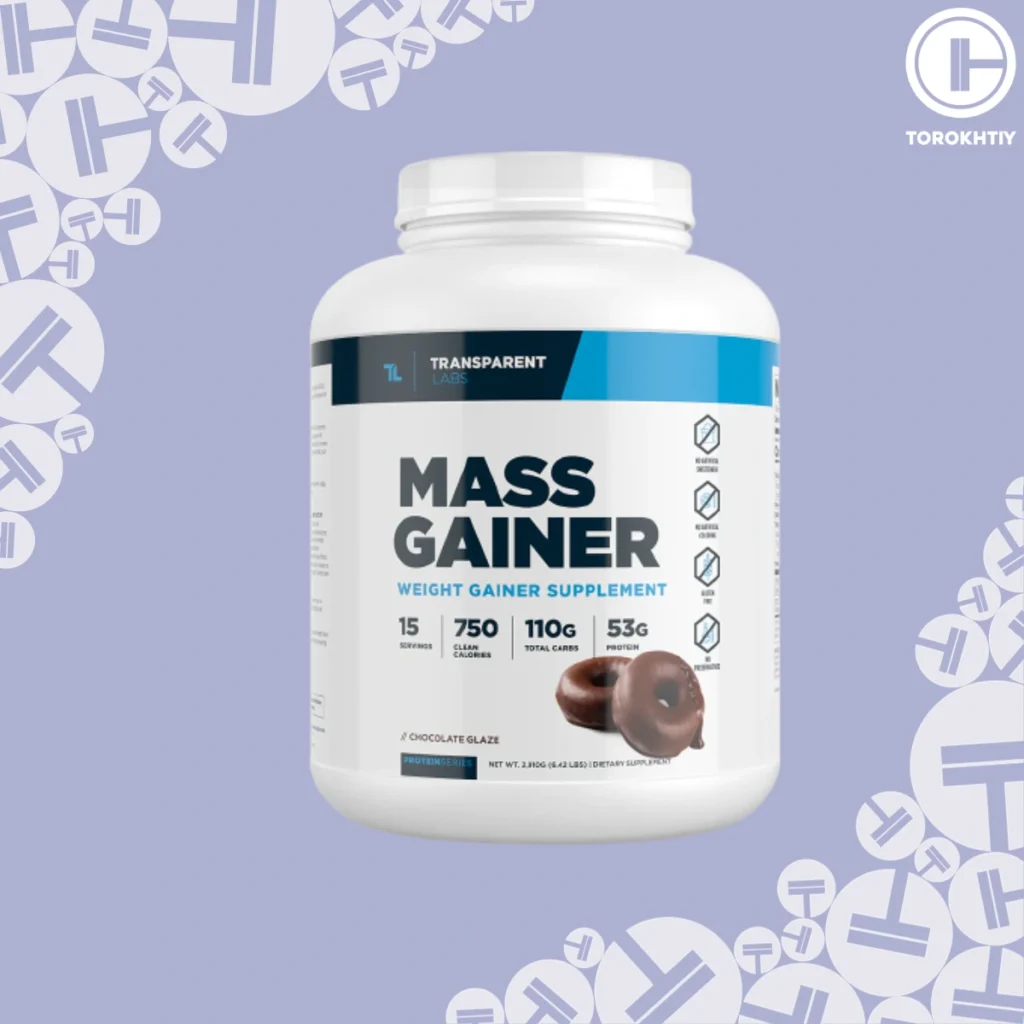
Still have questions after reading our article? Unlock your full potential by engaging with our experts and community! Don’t hesitate — leave a comment below and David Sasha Schulz will provide a personalized answer and insights to help you reach your goals.